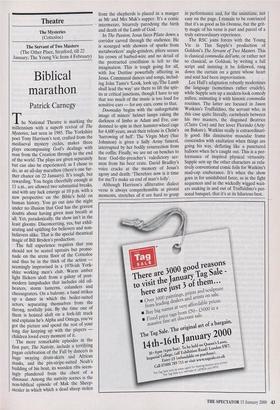Theatre
The Mysteries (Cottesloe) The Servant of Two Masters (The Other Place, Stratford, till 22 January; The Young Vic from 4 February)
Biblical marathon
Patrick Carnegy
The National Theatre is marking the millennium with a superb revival of The Mysteries, last seen in 1985. The Yorkshire poet Tony Harrison's text, crafted from the mediaeval mystery cycles, makes three plays encompassing God's dealings with man from the Creation through to the end of the world. The plays are given separately but can also be experienced, as I chose to do, as an all-day marathon (there's one fur- ther chance on 22 January). It's tough, but rewarding. You begin cheerfully enough at 11 a.m., are allowed two substantial breaks, and with any luck emerge at 10 p.m. with a new perspective on the Bible's hold on human history. You go out into the night under no illusion that God has the gravest doubts about having given man breath at all. Yet, paradoxically, the show isn't in the least gloomy. Disconcerting, yes, but exhil- arating and uplifting for believers and non- believers alike. That is the special theatrical magic of Bill Bryden's production. The full experience requires that you should not be seated upstairs but prome- nade on the arena floor of the Cottesloe and thus be in the thick of the action — seemingly improvised in a 1970-ish York- shire working men's club. Warm amber light flickers aloft from a galaxy of post- modern lampshades that includes old oil- heaters, storm lanterns, colanders and cheesegraters. On a balcony, a band strikes up a dance in which the boiler-suited actors, separating themselves from the throng, zestfully join. By the time one of them is hoisted aloft on a fork-lift truck and explains he's Alpha and Omega, you've got the picture and spend the rest of your long day keeping up with the players — children loved every moment of it. The more remarkable episodes in the first part, The Nativity, include a terrifying pagan celebration of the Fall by dancers in huge swaying drum-skirts and African masks, and the pin-stripe-suited Noah's building of his boat, its wooden ribs seem- ingly plundered from the chest of a dinosaur. Among the nativity scenes is the non-biblical episode of Mak the Sheep- stealer in which which a dead sheep stolen from the shepherds is placed in a manger as Mr and Mrs Mak's supper. It's a comic ' intermezzo, bizarrely parodying the birth and death of the Lamb of God.
In The Passion, Jesus faces Pilate down a corridor carved through the audience. He is scourged with showers of sparks from metalworkers' angle-grinders, pliers secure his crown of barbed-wire and no detail of the protracted crucifixion is left to the imagination. This is tough going for all, with Joe Duttine powerfully affecting as Jesus. Communal dances and songs, includ- ing John Tams's 'Look, look up,/The Lamb shall lead the way' are there to lift the spir- its at critical junctions, though I have to say that too much of the music is too. loud for sensitive ears — for any ears, come to that. Doomsday begins with the unforgettable image of miners' helmet lamps raking the darkness of limbo as Adam and Eve, con- demned to spin in their hamster-wheel cage for 4,600 years, await their release in Christ's 'harrowing of hell'. The Virgin Mary (Sue Johnston) is given a Sally Army funeral, interrupted by her bodily resurrection from the coffin. Finally, we are sat on benches to hear God-the-preacher's valedictory ser- mon from his beer crate. David Bradley's voice cracks at the memory of Jesus's agony and death: 'Therefore now is it time for me/To make an end of man's folly'.
Although Harrison's alliterative dialect verse is always comprehensible at pivotal moments, stretches of it are hard to grasp in performance and, for the uninitiate, not easy on the page. I remain to be convinced that it's as good as his Oresteia, but the grit- ty magic of his verse is part and parcel of a truly extraordinary experience.
The RSC joins forces with the Young Vic in Tim Supple's production of Goldoni's The Servant of Two Masters. This is classical commedia dell'arte, or rather not so classical, as Goldoni, by writing a full script and insisting it be followed, rang down the curtain on a genre whose heart and soul had been improvisation.
Lee Hall's adaptation robustly modernises the language (sometimes rather crudely), while Supple sets up a modern-look comedy milieu, animating it with historic commedia routines. The latter are focused in Jason Watkins's Truffaldino, the servant who, in this case quite literally, cartwheels between his two masters, the disguised Beatrice (Claire Cox) and her lover Florindo (Any- on Bakare). Watkins really is extraordinari- ly good. His diminutive muscular frame crescendos with exultation when things are going his way, deflating like a punctured balloon when he's caught out. This is a per- formance of inspired physical virtuosity. Supple sets up the other characters as rela- tively conventional comic foils for Watkins's mad-cap exuberance. It's when the show goes in for uninhibited farce, as in the fight sequences and in the wickedly wigged wait- ers snaking in and out of Truffaldino's per- sonal banquet, that it's at its hilarious best.


























































 Previous page
Previous page